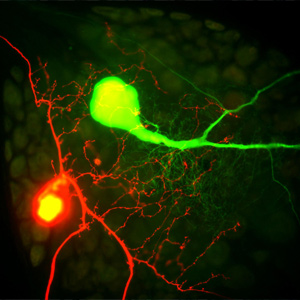
Neurobiology
 Confocal fluorescent image of two neurons in a leech segmental ganglion that were injected with dyes that fluoresce red and green. For scale, the green cell body is 70 microns across.Claire Discenza & Daniel Wagenaar, Imaging by Krista Todd
Confocal fluorescent image of two neurons in a leech segmental ganglion that were injected with dyes that fluoresce red and green. For scale, the green cell body is 70 microns across.Claire Discenza & Daniel Wagenaar, Imaging by Krista ToddThe Department of Neurobiology brings together a group of faculty who do research and instruction with the mission of understanding how nervous systems work. This task requires scientific approaches on different physical scales, from the level of single molecules to the level of the entire nervous system, and of different temporal scales from fractions of a millisecond to years. Faculty research is focused on analyzing brain circuits and neural networks, using genetics to understand sensory receptor function; sorting out the molecular mechanisms of neurotransmitter release and neurotransmitter receptor regulation; imaging information transmission in functioning neurons; and making computational models of processes from the movement of molecules in membranes to the control of behaviors. Molecular and cell biological techniques, biophysical recordings using a variety of electrophysiological and optical techniques, and computerized analysis are providing great insights into the functioning of single nerve cells, as well as complicated networks of neurons. This multidisciplinary approach is yielding insights into the rich complexity of mechanisms that influence how we think, feel, and act.
